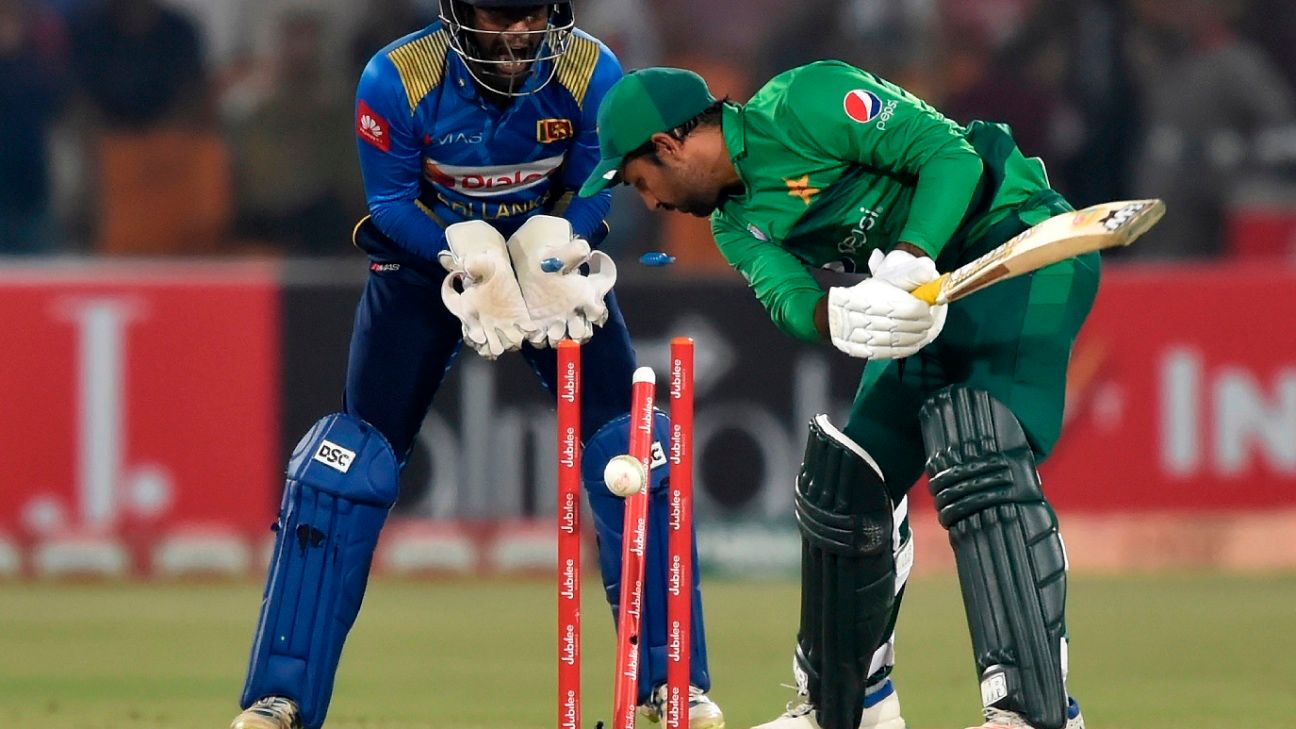
Misbah-ul-Haq has been welcomed into his dual position of head coach and chief selector with a 3-0 whitewash in the T20I series at the hands of a second-string Sri Lanka side. That has left Misbah and captain Sarfaraz Ahmed "clueless" with "lots of questions to answer".
Pakistan have been No.1 in T20Is for nearly two years now and losing this series at home, where they don't play too often, will hurt them further. Both Misbah and Sarfaraz answered questions at the post-match press conference about what went wrong since Mickey Arthur left.
"It's an example for us the way they have beaten us in every department," Misbah said. "They won the games in almost one-sided fashion leaving us in tatters and with lots of questions to answer. We played very poor cricket and definitely it's my responsibility but I am still thinking what really happened because these are the same set of players that have been playing for long and made the team No. 1."
When asked if the loss was because of a strategy change in the dressing room since Arthur left, Misbah said: "I haven't done anything in the last 10 days that could have deterred anything. If you want to put responsibility on me you can but in this brief time since I took charge how big a difference could I created with my coaching. The strategy was simple: to cash in on the Powerplay and later go all out in the last five overs. These are the same players who took Pakistan on top [in the T20I rankings] but in this series they were not able to execute things well with the bat, ball and while fielding."
These reasons may not comprehend properly how a top-ranked side can slide so quickly against a Sri Lankan team without their top players. But when Misbah was asked again, he got sarcastic.
"Maybe I did something? Probably I made our right-hand batsmen switch to left-handed batting or maybe made our right-handers bowl with the left arm or vice-versa? In terms of strategy, nothing really has changed but I am thinking what went wrong."
Sarfaraz came to the rescue of his coach and brushed aside any change of strategy or thought process in the T20 format.
"Everything is the same [in our planning] but the difference was our performance on the ground," Sarfaraz said. "We were not able to apply ourselves, we didn't click at the right time, we were not able to clinch the key moments. We shouldn't have let them cross the 150-mark but we did, we did not capitalise in the middle overs, we dropped catches…so all this played a part.
"Whether it's the last management or this, our message [to the players] was clear and almost the same. It's then the responsibility of the captain and players to deliver at the ground. But we didn't perform. There are good and bad days for almost everyone but we have to learn quickly from this. We have to regroup and stand together again and it will be good if we get our momentum back as soon as possible."
Pakistan have had a prolific run in the last two years in T20Is, winning 21 of their 29 matches with a win-loss ratio of 2.6, the best among teams that have played at least 15 matches in this period. Babar Azam, the No. 1-ranked batsman in T20Is, has played a crucial role in Pakistan's form in these 24 months by scoring 858 runs in 22 innings with a stellar average of 47.66 and strike rate of nearly 127.
But his lack of form, combined with Fakhar Zaman's, while opening in this series dented Pakistan's chances of getting off to dominating starts as Babar scored 27, 3 and 13 in their opening stands of 0, 9 and 13.
In the third T20I on Wednesday night, Fakhar was bowled on the first ball of their 148 chase before Babar and Haris Sohail steered the innings but they managed only 35 runs together in the Powerplay. Babar was later caught behind for a 32-ball 27 and Sohail brought up half-century off 46 balls but their asking rate kept climbing, leaving much of the work for the lower order. Pakistan were left to score 54 runs off 29 balls when Sohail fell for 52 and they eventually fell short by 13 runs.
"It's not that they (the top-order batsmen) were being selfish, they were unable to adapt to the slowness of the pitch," Misbah explained. "They were trying to hit but weren't able to which led to more dot balls and frustration. Babar wasn't able to time the ball in all three innings.
"It's unfair to say that both (Babar and Harris) were playing for themselves. Their position in the team is not uncertain and nobody is challenging their positions at the moment. It was Sri Lanka's good bowling which never allowed our batsmen to adapt properly. A big factor has been the impact of their wristspinner (Wanindu Hasaranga). We didn't pick his googly whereas they played our spinner nicely and batted well."















 Phone: (800) 737. 6040
Phone: (800) 737. 6040 Fax: (800) 825 5558
Fax: (800) 825 5558 Website:
Website:  Email:
Email: 






